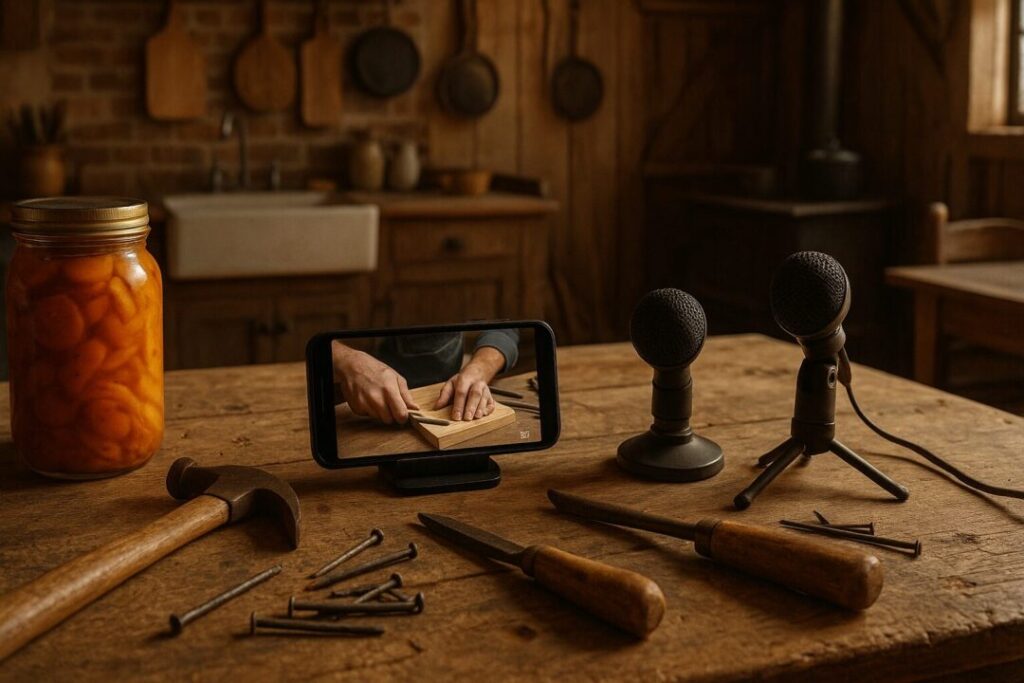In kitchens, barns, backyards, and garages all across America, platforms like YouTube and podcasts are now filled with creators teaching old-school skills like woodworking, canning, gardening, and cooking.
These videos may not have flashy graphics or big production budgets, but millions of people are tuning in anyway.
Why? Because the content feels real, useful, and honest.
People Over Platforms
Creators like Jimmy DiResta, who builds furniture and tools in his workshop, or Jill Winger of The Prairie Homestead, who teaches canning and gardening, have built huge followings.
DiResta has racked up millions of views just by showing how he works with his hands – and he’s not alone.
One homesteading channel, My Self Reliance, has over 2 million subscribers. Another, Roots and Refuge Farm, features a family raising their own food and living off the land.
These aren’t reality shows; they’re real life, and that’s what makes them special.
Unlike big media, these creators don’t need a network, a studio, or a polished script. They just need a camera, some know-how, and a connection with people who care about the same values: family, hard work, and independence.
A Return to American Roots
Many of these creators are bringing back skills our grandparents used every day, like baking from scratch, repairing tools, or growing food at home. Take Tasting History with Max Miller, where history and cooking come together to teach people how to make dishes from centuries past.
It’s not just fun to watch. It’s also preserving these old skills for future generations, and showing that they still matter.
I’s a breath of fresh air in a world that often pushes fast, disposable, and trendy.
This kind of content reminds us of what really counts: knowing how to do things for yourself, taking pride in your work, and passing on that knowledge to the next generation.
No Middleman Needed
One of the biggest reasons these creators are booming is that they don’t need permission from anyone to get started.
No big media bosses. No marketing teams. Just direct connection with their audience.
It’s a real-life example of the free market in action.
People watch because they want to, and that kind of voluntary support is exactly what conservatives mean when we talk about personal responsibility and free enterprise.
It’s also a rejection of top-down narratives.
While mainstream media often pushes political or cultural messages that feel out of step with rural or working-class America, these independent voices are going the other way – toward practical advice, real community, and timeless values.
Building Real Community
What’s more, these channels don’t just create content. They build communities.
Whether it’s folks sharing canning tips in the comments or learning how to fix a leaky sink from someone they trust, these online spaces are full of neighbors helping neighbors – even if they live hundreds of miles apart.
It shows that people are hungry for more than just entertainment. They want purpose. They want to learn, and they want to belong.
The Critical Side
Some might argue that these creators aren’t professional enough and worry about the spread of misinformation. But for many viewers those concerns sound a lot like the old gatekeepers trying to keep their grip on power.
After all, why should we trust a TV network with an agenda over someone who’s just showing you how to build a chicken coop in their backyard?
A Quiet Cultural Shift
This is what real influence looks like.
These channels may seem small, but they’re changing how people think and live. More folks are turning away from the noise and finding value in real skills and real community.
They’re proof that good ideas, hard work, and personal freedom still matter.
This article was written with the assistance of AI. Please verify information and consult additional sources as needed.




